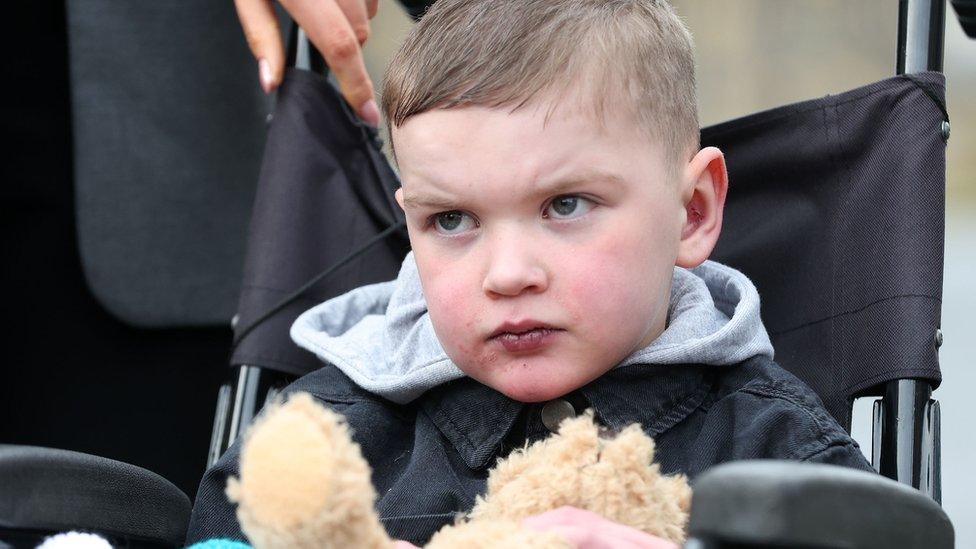Stormont Speaker blocked as bid to progress Dáithí's Law fails
- Published
Dáithí Mac Gabhann said he wanted the law to be passed "now"
The Stormont Assembly has once again failed to elect a Speaker after the Democratic Unionist Party (DUP) blocked the move.
The assembly met on Tuesday in a bid to pass a stalled organ donation law inspired by a six-year-old boy.
But the DUP had already said it would not allow a Speaker to be elected as part of its ongoing protest over the Northern Ireland Protocol.
It is the sixth failed attempt since the election in May.
The DUP has argued the legislation on organ donation in Northern Ireland can be dealt with at Westminster.
Without a Speaker, the organ donation legislation could not be passed.
Two nominations were made for Speaker as the assembly sitting began - Mike Nesbitt of the Ulster Unionist Party (UUP) and Social Democratic and Labour Party (SDLP) representative Patsy McGlone.
All the parties other than the DUP and the Traditional Unionist Voice (TUV) then spoke in favour of electing a Speaker and implementing the opt-out organ donation law, inspired by six-year-old Dáithí Mac Gabhann, who needs a heart transplant.
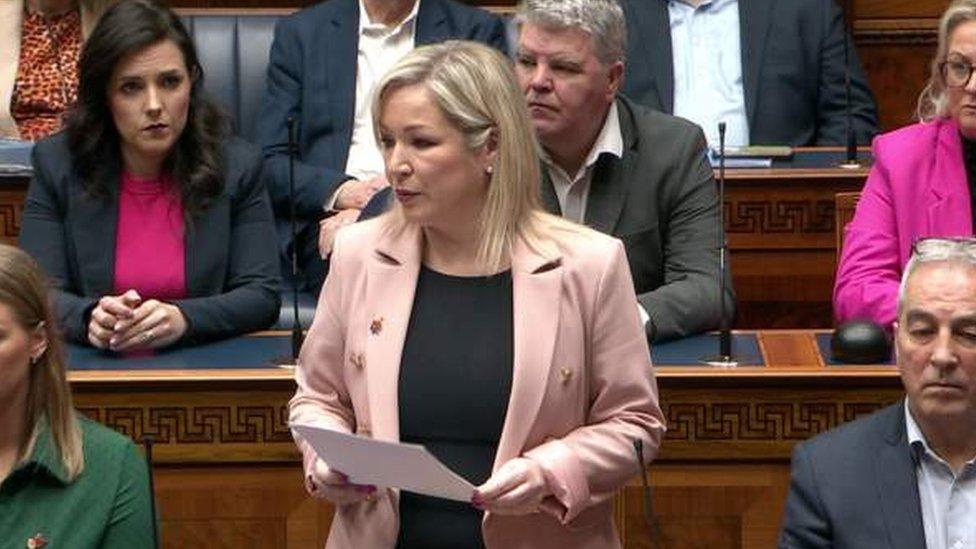
Michelle O'Neill said the power to deliver on organ donation was in the gift of each party
What is the opt-out system?
Northern Ireland is the only part of the UK where an opt-out organ donation system is not in place.
Dáithí's Law was introduced in the assembly in 2021 and passed its final stage in February 2022.
It would mean all adults in Northern Ireland would be considered as a potential organ donor after their death, unless they specifically stated otherwise.
However, additional legislation is needed to specify which organs and tissues are covered under the opt-out system.
Michelle O'Neill, Sinn Féin deputy leader, said the issue should transcend party politics.
"Over 130 people are currently waiting for an organ, 90% of people in the north support organ donation and every party in this chamber supports this law," she said.
"There is little else to be said. The power is in the gift of each party and every single MLA [assembly member] to do so."
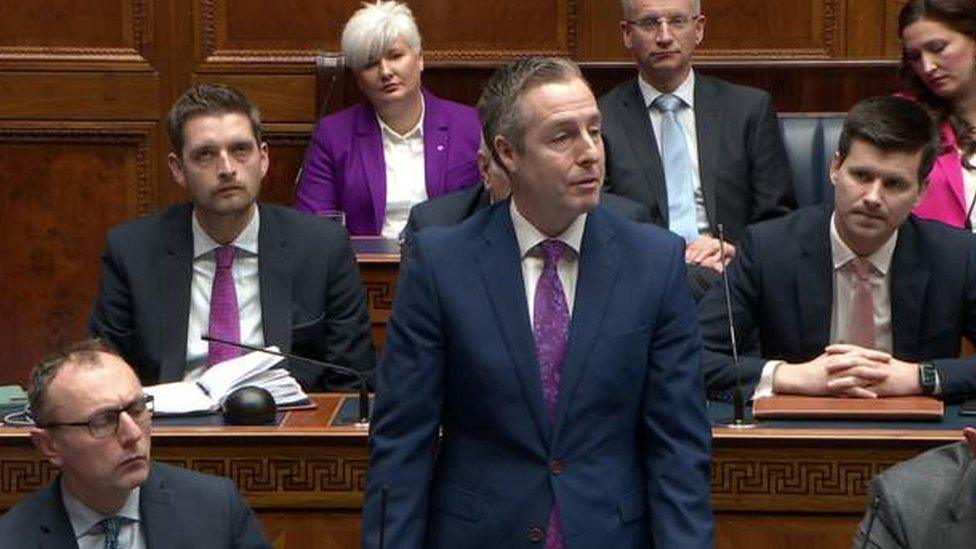
Paul Givan paid tribute to Dáithí's family for their campaign
Paul Givan, the DUP's health spokesman, paid tribute to the Mac Gabhann family and their campaign.
"What they are doing is exactly what I would do in their position," he said.
But he added the Northern Ireland secretary could act to resolve the issue at Westminster and he appealed to him to do so.
Alliance leader Naomi Long said the legislation needed to be delivered, adding that it was a life and death issue for people on the transplant waiting list.
She appealed to the DUP to "reflect on what is at stake".
The head of the British Heart Foundation in Northern Ireland, Fearghal McKinney, said they were "bitterly disappointed" that Dáithí's law could not be passed through Stormont.
Mr McKinney said roughly one person a month would die in Northern Ireland as a result of not being able to successfully get a transplant.
"This (legislation) won't guarantee a cure or success but what it does is it increases the chances of survival for the well over 100 people that are on the transplant organ list at the moment," he told BBC Radio Ulster's Evening Extra programme.
'Second-best option'
Robin Swann of the UUP, who was the health minister when Dáithí's Law was introduced in 2021 and passed in 2022, told the assembly the bill was an opportunity "not to just save lives but change lives".
"This bill was one of my proudest achievements as health minister," he said.
The SDLP's Colin McGrath said waiting for Westminster to deliver Dáithí's Law was the second-best option.
"How many more times does this place have to say 'no' when it should be saying 'yes?'" he said.


You could say the DUP opted out again today from devolution in the hope that those in Westminster will opt in and save Dáithí s law.
The party stood firm on its boycott of Stormont's institutions in the face of political and moral pressure to change course.
Facing Dáithí and his parents in the public gallery, former First Minister Paul Givan said it was a matter for Westminster to resolve.
Ideally, it is hoped the organ donation legislation will be tagged on in an amendment to the Executive Formation Bill in the House of Commons next Wednesday.
But that will depend on the Commons Speaker's office, who may deem the legislation is beyond the scope of the bill.
That decision will be made on the morning the bill is due before the Commons when Dáithí and his family will be in London.
They will hope it will not be yet another day of disappointment.

TUV leader Jim Allister said the law could only be passed at Westminster.
He said until issues around the Northern Ireland Protocol were solved, then Stormont was "doomed".
People Before Profit's Gerry Carroll said the situation was "absolutely cruel".
"People's lives are more important that the DUP's protocol protest," he said.
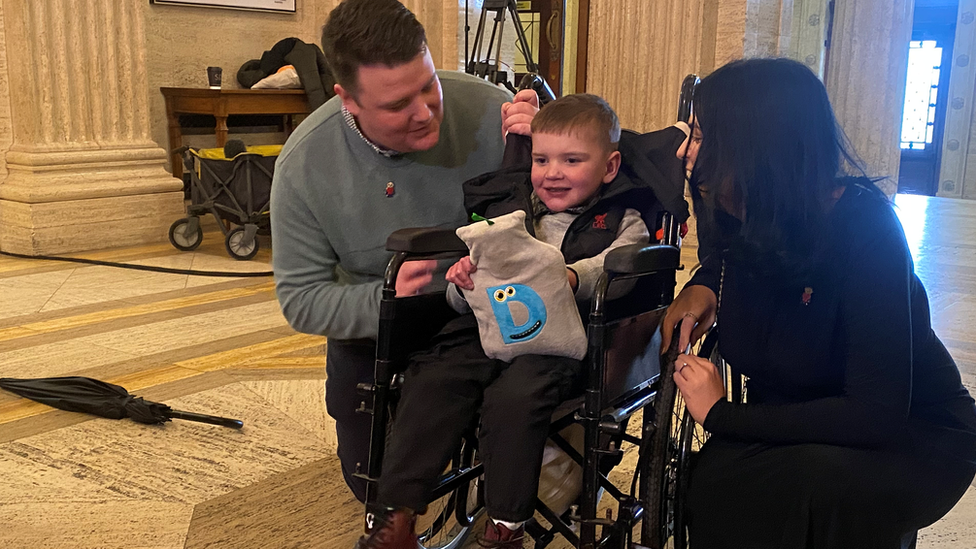
Dáithí Mac Gabhann and his parents are attending the assembly sitting at Stormont
Earlier, Dáithí's father Máirtín said the family was "disappointed, but not at all surprised" by the DUP's decision, adding that Mr Givan had informed them of the move on Saturday.
"Although disappointed that it can't be sorted out on Tuesday, we were also told that the DUP would do everything it can to see [that} Dáithí's Law goes through Westminster," he said.
"At this stage, we need it guaranteed that without a sitting assembly that it can be done at Westminster. Can Jeffrey and the DUP guarantee us that?"
- Published9 February 2023
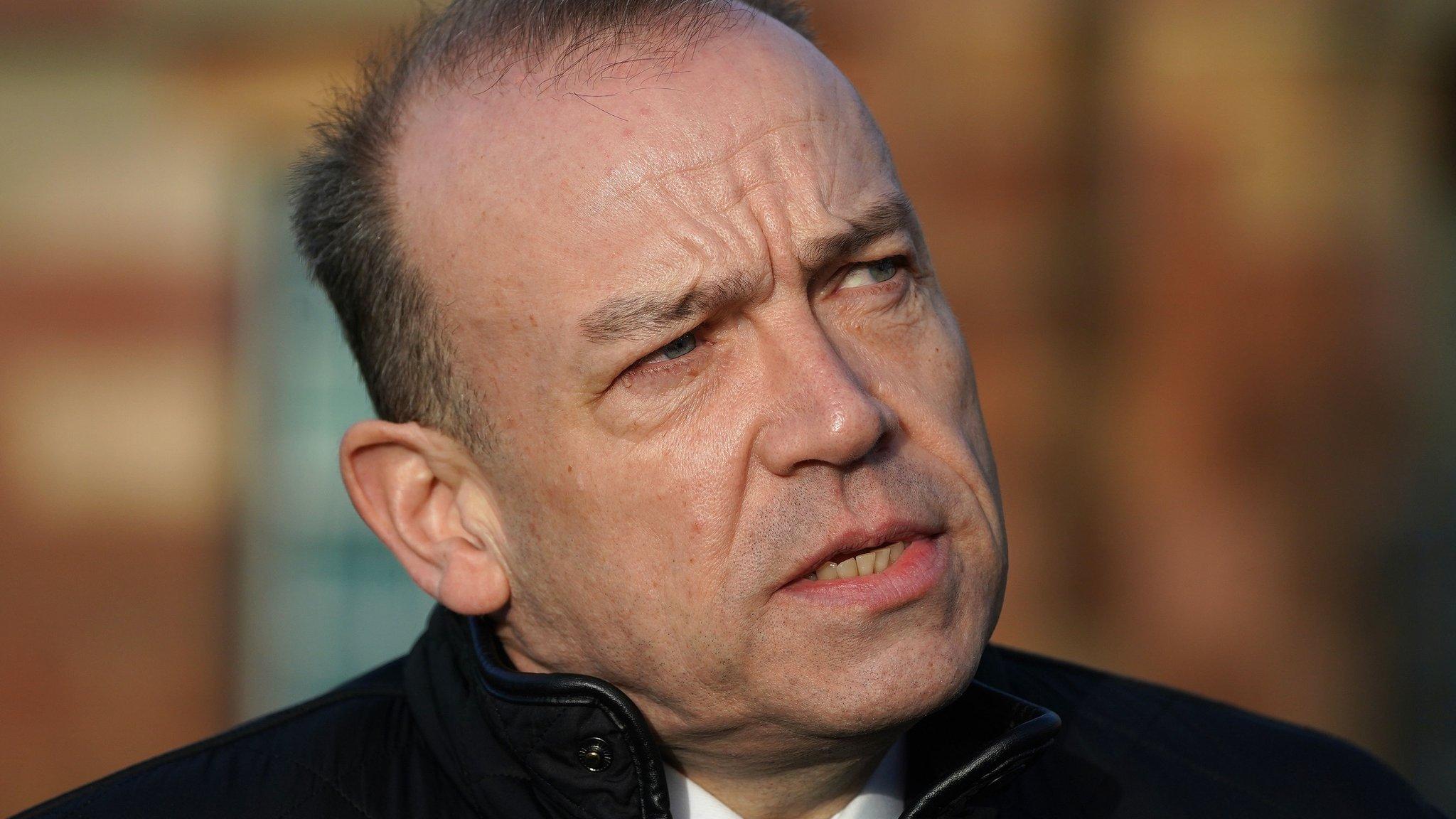
- Published1 February 2023
